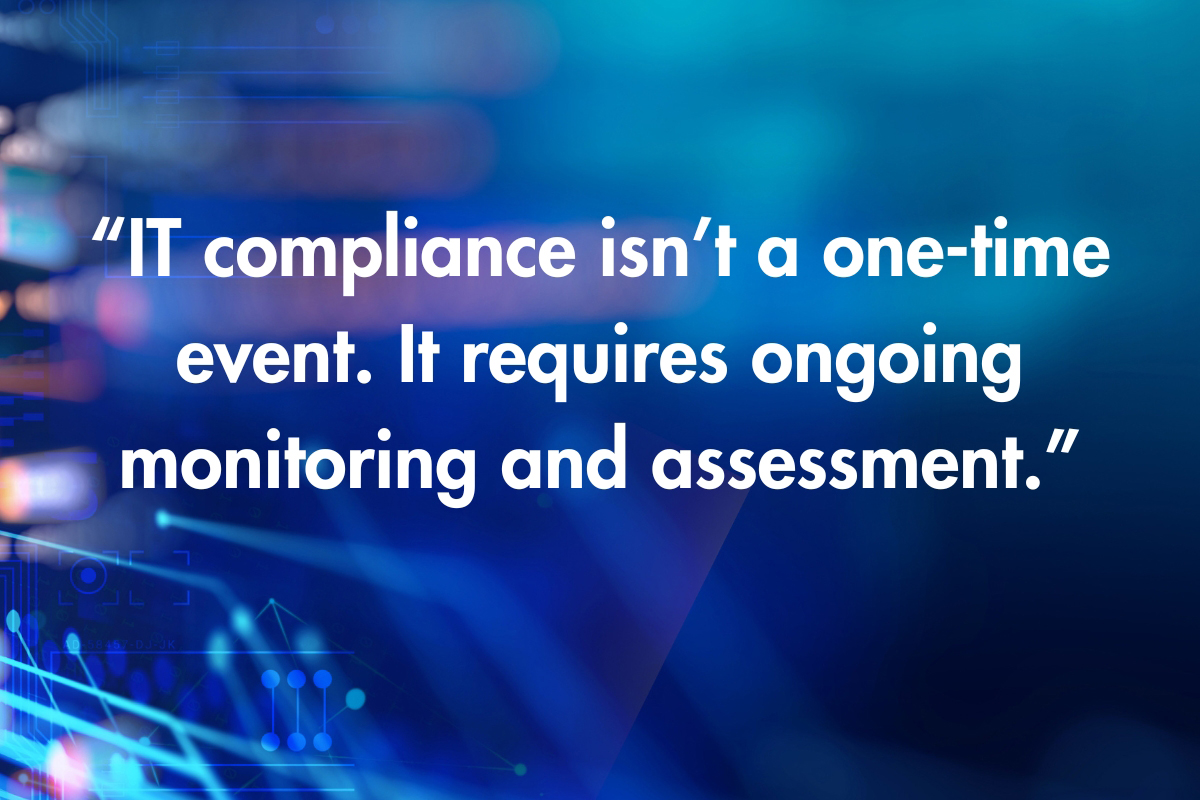IT compliance is no longer optional for Dental Service Organizations (DSOs). With patient records stored electronically, multi-location operations requiring interconnected networks, and increasing cyber threats, DSOs must ensure their IT infrastructure aligns with compliance standards.
Failure to comply with HIPAA, PCI-DSS, and other regulations can lead to data breaches, financial penalties, and reputational damage. As DSOs continue to grow through mergers, acquisitions, and new office openings, maintaining standardized, secure, and compliant IT systems across all locations becomes even more complex.
In this guide, I’ll outline the essential IT compliance steps every DSO should implement to protect patient data, secure their network, and ensure regulatory compliance.
Struggling to keep your IT systems compliant? Mellin Tech provides expert IT compliance solutions tailored specifically for multi-location dental groups.
1. Identify Key IT Compliance Regulations for DSOs
DSOs must adhere to several IT compliance regulations, including:
HIPAA (Health Insurance Portability and Accountability Act): Ensures the protection of patient health information (PHI) through secure data handling practices.
PCI-DSS (Payment Card Industry Data Security Standard): Regulates how patient payment data is collected and stored to prevent fraud.
OSHA (Occupational Safety and Health Administration): Establishes IT safety protocols for dental office equipment and cybersecurity risks.
State-Specific Regulations: Some states impose additional data retention and privacy laws that DSOs must follow.

2. Implement strong Security Measures for Patient Data
Dental offices rely on Electronic Health Records (EHRs), digital imaging, and cloud-based practice management software. Protecting this data is critical to HIPAA compliance.
Key Steps to Securing Patient Data:
✔ Data Encryption – All patient records must be encrypted in transit and at rest to prevent unauthorized access.
✔ Role-Based Access Control (RBAC) – Employees should have access only to the data necessary for their role.
✔ Automated Data Backups – Regularly scheduled offsite backups ensure data recovery in case of a system failure or cyberattack.
✔ Audit Logs & Monitoring – Maintain detailed logs of who accesses patient records and review them periodically.

By securing EHRs and implementing a data protection strategy, you can mitigate risks and maintain compliance across all locations.
Is your patient data fully protected? A compliance gap can put your entire practice at risk. We can assess your IT security.
3. Strengthen Your Cybersecurity to Meet HIPAA Compliance
HIPAA violations can result in fines ranging from thousands to millions of dollars. To remain compliant, DSOs must:
HIPAA Compliance Essentials:
Conduct Regular Risk Assessments: Identify and address vulnerabilities in your IT infrastructure.
Implement Multi-Factor Authentication (MFA): Require multiple security layers for login access.
Secure Communications: Use encrypted email, VoIP, and secure messaging platforms for patient communication.
Ensure Secure File Transfers: Use HIPAA-compliant cloud storage for document exchange.
Cyber threats targeting healthcare organizations are increasing, making proactive cybersecurity measures essential.
4. Secure Network Infrastructure and Connected Devices
A multi-location DSO is vulnerable to cyberattacks if network security is weak. To protect patient data and prevent breaches, DSOs should:
Install Firewalls & Intrusion Detection Systems (IDS): Prevent unauthorized access to the network.
Use Enterprise-Grade Antivirus Software: Protect devices from malware and ransomware.
Implement Endpoint Security: Secure all connected devices, including computers, tablets, and IoT dental equipment.
Regularly Patch & Update Software: Keep all operating systems and software updated to close security gaps.
With cloud-based dental software becoming more common, DSOs must monitor network security continuously to prevent unauthorized access.
Don't leave your IT infrastructure vulnerable to cyber threats. Contact us for a compliance assessment and ensure your network security meets HIPAA and PCI-DSS standards.
5. Train Staff on IT Compliance Best Policies
Even the best security tools won’t prevent breaches if employees aren’t trained in IT compliance best practices. Human error remains a leading cause of cybersecurity incidents.
IT Compliance Training for DSOs:
✔ Cybersecurity Awareness Programs – Train staff on identifying phishing attacks and social engineering scams.
✔ IT Policies & Procedures – Establish guidelines for password management, device usage, and data handling.
✔ Phishing Simulations – Conduct simulated attacks to test staff responses and improve awareness.
✔ Incident Response Drills – Ensure employees know what to do in case of a data breach or cyberattack.
DSOs that invest in ongoing training and policy enforcement are significantly less likely to experience compliance failures.
6. Ensure Vendor and Third-Party Compliance
DSOs rely on third-party IT vendors for software, cloud storage, and payment processing. However, third-party breaches are a growing concern.
How to Ensure Vendor Compliance:
Sign Business Associate Agreements (BAAs): Vendors handling patient data must legally commit to HIPAA compliance.
Perform Vendor Risk Assessments: Regularly evaluate third-party security protocols.
Limit Third-Party Access: Only provide vendors with the necessary data access required for their services.
A weak vendor security posture can jeopardize your compliance efforts, making vendor assessments essential.
7. Conduct Regular IT Audits and Compliance Reviews
IT compliance isn’t just a one-time event—it requires ongoing monitoring and assessment.
Essential IT Compliance Audits for DSOs:
Annual HIPAA & Security Audits – Evaluate IT security measures and update policies accordingly.
Real-Time Compliance Monitoring – Use automated compliance tracking tools to flag risks.
Incident Response Planning – Create a breach response plan to quickly contain security incidents.
Penetration Testing & Vulnerability Scans – Identify security weaknesses before hackers do.

By conducting regular IT audits, DSOs can stay ahead of compliance challenges and demonstrate regulatory adherence in case of an inspection.
The Key to Compliance Is Proactive IT Management
Compliance is an ongoing process that requires a combination of secure technology, employee training, and regular audits. DSOs that take a proactive approach to IT compliance will not only avoid penalties but also build patient trust and ensure operational efficiency.
At Mellin Tech, we specialize in helping DSOs implement secure, compliant IT infrastructures. Whether you need HIPAA assessments, cybersecurity solutions, or IT audits, we provide tailored solutions to support multi-location dental groups.




